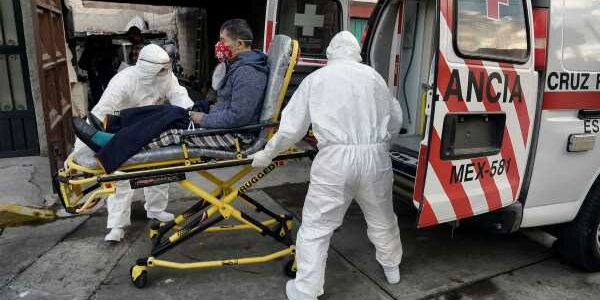
Mexico City Says Hospitals Have Beds, But Paramedics Can’t Find Them
This is what it’s like on the front lines of Mexico City’s pandemic right now:
* A 77-year-old man is rushed to a hospital but stranded inside the ambulance for 11 hours before a bed is free.
* A 50-year-old paramedic who’s spent months helping others gets sick and can’t breathe. After five hours of desperate calls by colleagues, he gets a bed, and dies the next day.
* After driving a patient all night around the city, Miguel Mata heads north for three hours and finds an emergency room with a bed.
For three days last week, Mexico saw national deaths surge by more than 1,500 with the total now past 150,000 and on track to overtake India for the third-highest mortality toll. Covid seems everywhere. President Andres Manuel Lopez Obrador and the country’s richest person, Carlos Slim, bothannounced they have mild cases.
The worst is in the capital region, with its 21 million residents and excess fatalities which reports show to be higher than any major city in the world.
Just ask the ambulance drivers.
“We hear the government say we’re at around 90% capacity and that should mean when you get to a hospital there will be at least one bed available,” said Mata, who heads an association of 15 private ambulance providers. “That’s not what we’re seeing. Today, getting a bed in Mexico City comes down to luck.”
Mexico City acknowledges that hospital occupancy is high but says it is still holding up. It says it has close to 1,000 available beds and is making extraordinary strides to add ventilators and equip more hospitals, including one with funds fromGrupo Modelo, a brewing conglomerate.
“Every institution is making a huge effort to find ventilators in the face of the increasing hospitalization rate,” the city’s health commissioner, Oliva Lopez, said in an interview. “We planned to add 100 by the end of January but we’ve managed to add more than 200 ventilators.”
But the numbers keep shifting. Total beds with ventilators started the year at 2,069 in January, only to drop a week later and then reach a high again a few days after. Officials say it’s because new ventilators that had yet to be counted weren’t working properly at first. The city also says its smartphone app that tells patients which hospitals have beds can’t keep up and better to call 911 instead.
Even the city’s own 911 control center isn’t fast enough, says Diego Arcos, who heads Red Cross’s emergency motorcycle units in the capital.
“The truth is they’re completely overrun,” said Xavier Tello, a health-policy analyst at Strategic Consulting in Mexico City. “Everything is accelerating exponentially because low hospital access means people with mild, moderate and serious symptoms are all at home, infecting their family members. It’s a never-ending snowball.”
The 77-year-old patient was driven around on Wednesday to medical centers that were supposed to have beds. Instead Arcos spent all night coordinating motorcycles to bring the semi-conscious man tanks to lift his oxygen levels to 75% from 39%. He was finally admitted to a hospital.
“If we have to wait this long, it’s because there’s nothing available,” said Arcos, who struggled for hours to get his fellow Red Cross paramedic a bed earlier this month before he succumbed to the virus. “We have to wait until someone is discharged or someone dies.”
The city’s health commissioner recognizes the city’s resources are strained and that patients wait two hours from home to hospital, on average. “But we still have room to maneuver,” she said. Hospitalizations in Mexico City grew by 21% the week of Jan. 11, but Lopez says that acceleration rate has started to show signs of slowing.
The city has implemented a strategy of hospital release for Covid patients who show stable vital signs and can be closely monitored at home. About 24,000 patients have been through that program since the pandemic began.
That might help ease pressure at hospitals but one of the measures for sending people home — 90% oxygen saturation — would be enough to send them to the hospital in other places.
Rafael Aguilar, the head medic at the city’s Red Cross, has had to return patients to hospitals who he said were released too soon. “Horrible, terrible, these words can’t even describe what’s going on at this moment,” he said.
Source: Read Full Article